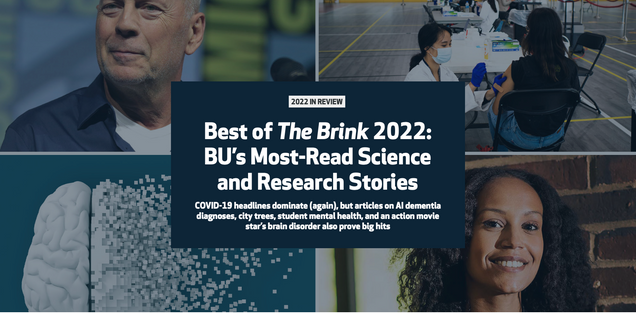Best of The Brink 2022: BU’s Most-Read Science and Research Stories
 The Brink published its most-read science and research stories of 2022, featuring work or commentary from the Hariri Institute community. Read excerpts with the links to the full stories below.
The Brink published its most-read science and research stories of 2022, featuring work or commentary from the Hariri Institute community. Read excerpts with the links to the full stories below.
Story: What Will Bruce Willis’ Aphasia Diagnosis Mean for the Veteran Actor?
For answers, The Brink turns to experts in aphasia, including Swathi Kiran, a Hariri Research Fellow and Faculty Affiliate, director of BU’s Aphasia Research Laboratory, professor of neurorehabilitation, and clinical director of BU’s Aphasia Resource Center. Kiran says, “There is no cure for aphasia (but) traditional treatments for aphasia are proven to be quite effective… There’s promising new data being published showing that such structured rehabilitation can slow the disease down or even stall it.”
Story: NEIDL Researchers Refute UK Article about COVID Strain
Boston University is refuting a series of misleading claims about research at the University’s National Emerging Infectious Diseases Laboratories (NEIDL), calling them “false” and “inaccurate.” Hariri Faculty Affiliate Ronald B. Corley, NEIDL director and BU Chobanian & Avedisian School of Medicine chair of microbiology, explains the research, which was was reviewed and approved by the Institutional Biosafety Committee (IBC), which consists of scientists as well as local community members, and that the Boston Public Health Commission had approved the research. Learn more.
Story: Could a Computer Diagnose Alzheimer’s Disease and Dementia?
A Boston University researchers develop an artificial intelligence program that detects cognitive impairment accurately and efficiently from voice recordings. Their machine learning–powered computational model can detect cognitive impairment from audio recordings of neuropsychological tests—no in-person appointment needed. Their findings were published in Alzheimer’s & Dementia: The Journal of the Alzheimer’s Association. Hariri Institute Director Yannis Paschalidis (ENG) says the model was not only able to accurately distinguish between healthy individuals and those with dementia, but also detect differences between those with mild cognitive impairment and dementia. And, it turned out, the quality of the recordings and how people spoke—whether their speech breezed along or consistently faltered—were less important than the content of what they were saying.
Story: City Trees and Soil Are Sucking More Carbon Out of the Atmosphere Than Previously Thought
For more than a decade, Hariri Faculty Affiliate and Research Fellow Lucy Hutyra (CAS) has been investigating what happens to the planet’s “lungs” when large forests are cut down into smaller patches, a process researchers call forest fragmentation. Hutyra discusses her recent study that points to the need to better understand and conserve existing forest edges, which are typically seen as more disposable. “We are underestimating how much carbon is being taken up by temperate forest edges,” Hutyra says. “We also need to think about how susceptible they might be in the future to climate change,” because previous studies have shown that even though these trees are growing faster from more sunlight, hotter temperatures cause growth rates of edge trees to plummet.”
Story: How Worried Should We Be about Monkeypox?
As suspected and confirmed cases of MonkeyPox began to rise last summer, including in the Boston area, the level of concern grew. For some perspective on monkeypox, The Brink spoke Hariri Institute Faculty Affiliate John H. Connor, a virologist at Boston University’s National Emerging Infectious Diseases Laboratories (NEIDL) and a BU School of Medicine associate professor of microbiology.